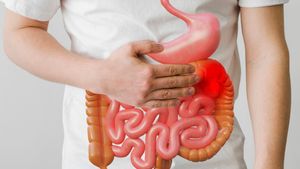YOGYAKARTA – Mother's milk (ASI) is the best intake for newborns up to 6 months of age. According to the American Academy of Pediatrics, cow's milk should not replace breast milk or formula. What is the reason? Here's the presentation.
Cow's milk has a different formulation with breast milk, which means, according to doctor Jae Kim, reported by Live Science, babies can't drink it. Cow's milk contains protein that is difficult for babies to digest. Even this milk does not contain enough essential vitamins and minerals that help babies develop. According to the Director of the Division of Neonatology at Cincinnatii Children's Hospital, formula manufacturers that use cow's milk, generally remove and change protein so that the formula is useful for supporting baby growth.
Newborns up to 6 months of age, have digestive systems, kidneys, and immune systems that are not yet strong enough to tolerate the protein from cow's milk. Because it is still in the developmental stage to carry out its function perfectly, parents must avoid giving cow's milk to their baby before their digestive system is really strong.

In cow's milk, contains high concentrations of protein and minerals. According to the recommendations of the American Academy of Pediatrics, it should be avoided because it can stress the newborn's kidneys and cause diarrhea and fever.
"That's why we recommend avoiding cow's milk for the first year of life," said Kim.
While some babies over 6 months, may be more receptive to foreign proteins which in some babies, if not suitable can cause inflammation through the allergic system. The allergic response can cause inflammation of the baby's intestines or microscopic bleeding in the lining of their intestines, Kim said.
Because cow's milk cannot meet the iron needs of infants, it is also prone to causing anemia. This means, overall, cow's milk can cause the baby to be unhealthy.
Kim explained further, the risk will be experienced lower with age. At the age of 6 months, babies enter the age of solid food. Well, because milk is not the only source of nutrition, maybe your baby will get enough nutrition from other food sources. At this age, even though the baby has a more mature gut, kidney and immune system, it is worth reconsidering when giving cow's milk.
When it comes to giving cow's milk for supplementary food to babies over 1 year of age, use the introduction system and watch for signs and symptoms of an allergic reaction. Slowly give little by little, avoid giving too much straight away because it will shock the baby's digestive system. Symptoms that you need to observe, gradually whether the baby has spitting up or diarrhea more often.
The worst effect if you are intolerant to cow's milk, when you find blood in the stool. This marks the occurrence of inflammation in the large intestine. These symptoms are usually accompanied by a swollen face, paler, and weaker body. If you experience this, stop immediately giving cow's milk and consult your pediatrician.
The English, Chinese, Japanese, Arabic, and French versions are automatically generated by the AI. So there may still be inaccuracies in translating, please always see Indonesian as our main language. (system supported by DigitalSiber.id)











